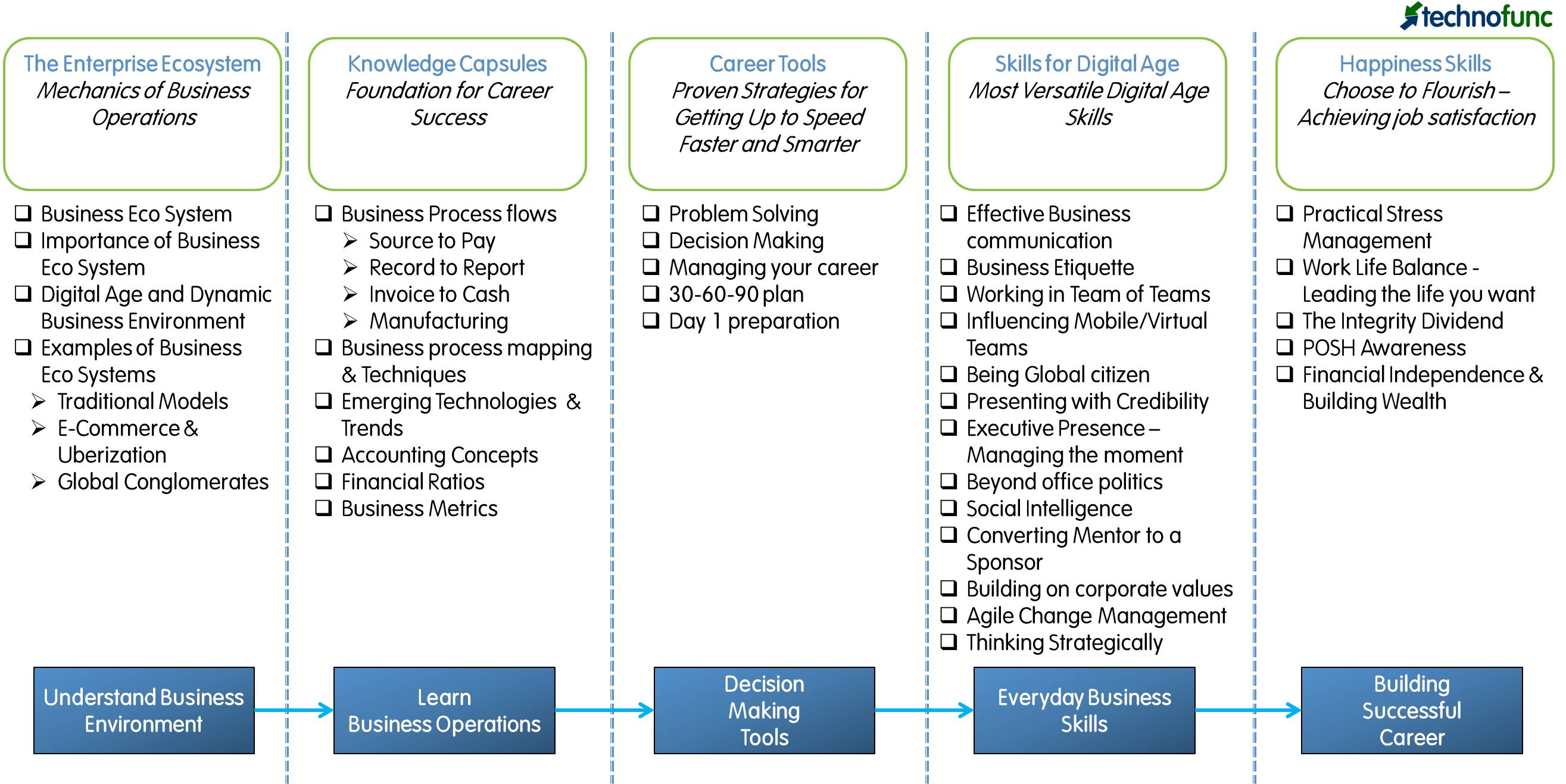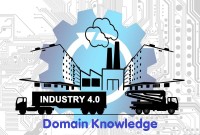- Home
- Business Processes
- Industry Knowledge
- Aerospace Industry
- Automotive Industry
- Banking Domain
- BFSI Industry
- Consumer/ FMCG Industry
- Chemicals Industry
- Engineering & Construction
- Energy Industry
- Education Domain
- Finance Domain
- Hospitality Domain
- Healthcare Industry
- Insurance Domain
- Retail Industry
- Travel and Tourism Domain
- Telecom Industry
- Leadership Skills
- eLearning
- Home
- Leadership
- Project Leadership
- Top Management Skills
Top Management Skills
In today's business world, proficiency in management skills is essential for career growth and success. Managerial skills can be defined as attributes or abilities that are essential for every leader and manager to succeed and fulfill specific tasks expected from them by the organization.
Role of Managers
Management makes human efforts more productive. It brings better projects, plants, equipment, officers, products, services, and human relations to our society. Improvements and progress are constant watchwords. The roles and responsibilities of a manager include performing functions like planning, organizing, staffing, directing, and controlling. A manager is responsible for managing a department or team and handling several administrative tasks. Managers need to administer and coordinate resources effectively and efficiently to ensure their usage in the successful accomplishment of the business objectives.
A manager's role starts with understanding the business objectives and performs the goal setting for his department and team. He needs to mobilize and utilize the resources to accomplish the desired results within predetermined constraints of time, effort, and cost. The manager administers the day to day management of effective utilization of resources like men, materials, machines, methods, money, and markets.
What are Management Skills?
Managers to be successful have to know how to do things efficiently and effectively, so they are indeed a unique scientific and artistic combination in practice. Management skills can be defined as the set of abilities and efforts applied by the managers in order to effectively achieve the organizational goals.
To accomplish all these tasks a manager needs proficiency in many skill areas like great communication, time management, organizational awareness, problem-solving, decision making, and creativity clubbed with other essential leadership skills.
The Top Management Skills You Need
You may want to work on the following skills for enhancing your success, more particularly when you get into a managerial position.
Understanding of Management Concepts
As a manager, you are responsible for controlling and managing your team in order to accomplish your business goals. You also need to refine your Leadership & Management Skills in order to motivate, influence, and enable other employees to make a meaningful contribution to the success of your organization. A strong foundation on Leadership Theories and understanding of various Leadership Styles will help you easily fulfill your responsibility as a manager.
Project Leadership
Towards realizing the organizational or project/program goals you need to have strong project management skills. Know the goals of your organization, understand the project scope and objectives, build an effective team by selecting the right subordinates, and delegate work by letting subordinates decide issues within their respective spheres of operation and check to ensure that the results being obtained are satisfactory. Planning is the process of setting goals, developing strategies, and outlining tasks and schedules to accomplish organizational goals. A plan well laid is half the job done.

Team Leadership
A team leader is someone who provides guidance, instruction, direction, and leadership to a group of individuals for the purpose of achieving the desired objectives. The team leader monitors the quantitative and qualitative achievements of the team and reports results. As a manager, you should select your group members carefully and continuously motivate them and try to minimize the conflicts among them. Strive to attain effective interpersonal relationships. Visit the section on team leadership to learn more about team management. Delegation is the assignment of certain duties and responsibilities by the manager to the subordinates. However, the manager still remains accountable for the work delegated.
Communication Skills
Communication is an act of sharing ideas and information. There are three types of communication written, oral and gestural. A manager should focus on improving his communication skills as well as human relations. One can strengthen human relations by speaking and listening effectively and trying to examine the situations from the other person's viewpoint.
Creativity Tools
Creativity can be defined as looking where all have looked but seeing what no one else has seen. Creativity is the art of doing things in a different way that leads to new and unexpectedly better results. Learn to develop creative solutions to business problems using Creativity Tools.
Decision Making & Problem Solving
Problem-solving and decision-making are important skills for business and life. Problem-solving and decision-making are closely linked, Problem solving often involves decision making. Being able to make decisions and solve problems effectively is necessary for every manager to produce end results.
Strategy Tools
There is no doubt that strategic management tools and techniques are important parts of the manager's day to day life. The manager needs to participate in the strategic management process and perform analysis and planning. A manager should view management as the opportunity to set strategic direction by influencing other people favorably and should also evaluate what’s achieved and, if necessary, take remedial action. Managers should know the business strategy and work towards making a business unique and successful.
Stress Management
Effective stress management helps the manager to effectively deal with organizational and personal stress. Stress management tools help you to be happier, healthier, and more productive. The ultimate goal is a balanced life, with time for work, relationships, relaxation, and fun. Express personal feelings and understand the feelings of others and look for the best in others. Make sure each group member is assigned the work best suited for that person and encourage members to assume responsibility.
Change Management
Organizations need to change to stay relevant. Change management strategy is critical to not only humanizing change but making it last. Managers act as agents who cope with change and bring about change for the betterment of the organization.
Time Management
Time Management is more than just managing time. It is about controlling the use of the most valuable - and undervalued - resource. It is managing oneself in relation to time. It is setting priorities and taking charge of the situation and time utilization. To improve time efficiency managers should spend time on matters that are really important and plan and follow through on programs.
Career Management
Management offers abundant opportunities. The choice of careers is steadily broadening and covers a wide range of talent and ability. Every major activity in every organization involves the management of personnel. Whether you become an academic or an administrator in an organization or a worker or a field functionary at any level in any field, you need to focus on your career management yourself. Managers are also responsible for providing career direction to their team members.
The concepts and skills discussed throughout our website will be useful to you to adapt them to your work situations for your effective functioning and organizational management or administration.
For yourself always set high standards for proposed levels of achievement and become effective in decision-making. Adopt a questioning attitude to discover and use new ideas and be a leader by getting involved in the action. Evaluate your team members consistently and provide timely constructive feedback and keep working towards increasing personal overall domain and functional knowledge while sharpening your leadership skills.
Related Links
You May Also Like
-
Team Development by Building Trust
As your team begins to work together, you need to establish a way each team member can exchange ideas and build mutual trust. Successful groups are built on trust and collaboration. A free exchange of ideas, in an open environment, will allow your team to get to know each other and enable you to check on how they work together. Learn some tips to help build team trust and establish personal bonds.
-
Guide to Technical Leadership Skills
Technical leaders care about building amazing products and the best technical capabilities in their teams. Everything they do is focused on improving the user experience and bringing competitive advantage for their organization. Learn the skills and competencies you need to build a technical career path for yourself that starts with building technical expertise and grows into developing technical leadership.
-
Tips for Effective Time Management
After studying and analyzing how time is spent, why time is wasted, and where time is wasted you need to decide about the changes required for effective utilization of time. For this purpose, a large number of remedial measures can be taken by you. The first and foremost determinant of a planned and purposeful utilization of time is to develop consciousness of the value of time at all levels of the organization. Planning, goal setting, and defining priorities are concerns to addressed immediately.
-
Improving Skills & Competencies
Whenever you are looking for a job or having your yearend discussion with your manager, two terms generally referred to be “Skills” and “competencies”. Today success in a career is an outcome of having essential competencies and building required skills. Skills could be a major distinguishing factor for you to move up on the career ladder and jump from one role to another. Leadership skills when combined with relevant domain and functional expertise can transform your entire career growth and help you have a fulfilling career.
-
Building Your Domain Knowledge
Domain knowledge from a career management perspective encompasses the understanding of industry dynamics and business processes of the target operational area. Domain expert exhibits clear knowledge in the respective industry and understands the industry concepts in general. It is always recommended to best highlight your exposure of domain in your resume or cover letter. TechnoFunc provides you with the best tutorials to gain domain knowledge in a large number of industries and business areas.
-
Tools for Developing Your Team
If a manager has too many weak spots in the talent of the team, the ability to empower the team members to independently execute the project is impaired. Assignments fall behind schedule or stretch out because the needed skills or knowledge are not in place when needed. To successfully execute important projects, hiring talented people, and increasing the talents of existing staff are most important.
-
Evaluating Your Career Interests
Want to find out what you are best at when it comes to proactively building your career? What are your real interests? The first step in career planning is reflecting. Reflecting upon your own self, to be more self-aware, and then following your dreams with both your heart and mind. Here is an opportunity to begin exploring yourself. At the end of the process, you will have a far better understanding of your desires than you have currently.
-
Concept & Definition of Stress
Stress is a popular expression used by people in day to day life. Pressures of day to day living sometimes necessitate coping or dealing with them and stretch the body beyond its natural capacity. They are called stressors. Stress is a natural, ongoing dynamic, and interactive process that takes place as people adjust to their environment.
-
Technology represents tremendous value if you view it from the proper perspective. IT empowerment also has its various levels in any organization. As a CIO or IT Senior Leader, you should try to move the technology function up the value chain. Learn how to transform your service delivery organization being looked upon as another cost center to a business partner that provides valuable services and brings competitive advantage for the business.
-
Importance of Technical Skills
Today’s business environment is complex and changing at a fast pace. Tough business problems require technical expertise to create cost-effective & sustainable solutions. All industries need some kind of technical skills to accomplish complex actions, tasks, and processes relating to computational and physical technology as well as a diverse group of other enterprises. The acquisition of advanced technical skills requires specific education certification or training, often with practical hands-on learning.
Explore Our Free Training Articles or
Sign Up to Start With Our eLearning Courses

About Us
Learning
© 2023 TechnoFunc, All Rights Reserved










